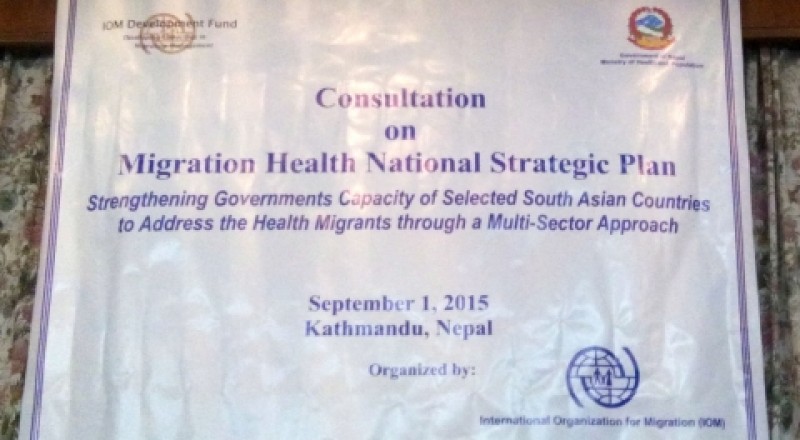Migration has been a feature of Nepal’s social landscape since the early 19th century. From Gurkha recruitment to the current outflow towards Gulf countries and Malaysia, labour migration is an important and unavoidable development phenomenon in Nepal’s current context.
Labour migration – in pursuit of economic gain and remittance generation has been a forced choice for many Nepalis due to various push factors such as unemployment, gender discrimination, social exclusion, conflict, displacement, population growth and livelihood insecurity. Cultural differences in the destination countries, in terms of difficulty in communication and understanding rules and regulations have also added complexities for the labour migrants. Despite large volume of remittance gain through labour migration, the push factors or the “drivers” of migration have also been the leading causes for health vulnerabilities of migrants during the periods of departure, transit and stay in the destination countries.
Migrants and Health Vulnerabilities
Prevalence of diseases such as HIV, tuberculosis, mental health issues and occupational hazards are some of the health vulnerabilities that the labour migrants have been facing. Lack of proper legal arrangements, lack of proper monitoring and regulation system during the periods of departure, transit and stay in destination countries, lack of enough preparation in terms of thorough orientation on health vulnerabilities during pre-departure orientation sessions, poor education and knowledge of the labour migrants and lack of robust diplomatic relationship to address problems of labour migrants have been the major barriers towards the health vulnerabilities of migrants not being addressed adequately.
Efforts to address the problems
Global organisations such as International Organization for Migration (IOM) along with various other stakeholders working in areas of labour and migration are mainstreaming this important agenda into local, national, regional and global platforms.
An initiative was launched by IOM in March 2013 with a multi-country project in Nepal, Bangladesh and Pakistan titled, ‘Strengthening Government’s Capacity of Selected South Asian Countries to address the health of migrants through a multi-sector approach’. Under this project, HERD has been the national partner for Nepal to generate the national evidence regarding situation of health vulnerabilities of Nepali migrants with the study, ‘Baseline Assessment of Health Vulnerabilities of Inbound and Outbound Migrants in Nepal’.

Dr. Sushil Baral, HERD Executive Chairperson - presenting major findings from the baseline assessment during the National Validation Workshop conducted in July 9, 2014
From Evidence to Policy and Practice
Based on the national report prepared by HERD with the support of IOM, a 3-year National Strategic Action Plan on Migration and Health (2015/16 to 2017/18) has been drafted by the Ministry of Health and Population (MoHP) with former MoHP Secretary, Dr Praveen Mishra, IOM’s national consultant leading the action plan development process. National Consultation Meeting on Migration Health National Strategic Action Plan was held on September 1, 2015 at Hotel Himalaya, Kathmandu to share and discuss about the draft plan among national stakeholders.

Mr. Maurizio Busatti, Chief of Mission, IOM addressing the national consultation meeting held on September 1, 2015
Major highlights of Draft National Strategic Plan
- With Ministry of Health and Population as focal point, getting various national agencies on board by forming an inter-ministerial committee represented by – Ministry of Foreign Affairs, Ministry of Labour and Employment, Ministry of Federal Affairs and Local Development, Ministry of Home Affairs, Ministry of Women, Children and Social Welfare
- Getting support from various External Development Partners and other national stakeholders
- Ensuring decent and productive employment conditions of freedom, equity, security and human dignity
- Ensuring health and wellbeing of migrants’ families
- Ensuring support and creating of enabling environment for migrants during 3 phases of migration cycle: pre-departure, during travel, at destination and upon return.
- Developing and implementing comprehensive and standardized health assessment for outbound migrants at pre-departure stage
- Formalizing migrants’ protection through bilateral agreements and memorandum of understanding
- Ensuring widespread access to pre-departure health related information through different government and non-government channels
- Offering voluntary health assessment for returnee migrants
- Providing physical and mental health support to migrants and their families
- Developing social protection mechanism for internal migrants
- Improving access to primary occupational health care to all internal migrant population
- Improving access to health information for internal migration through life course approach
- Strengthening and implementing system for monitoring, assessment and surveillance of migrants including conducting death audit
Dr. Sushil Baral, HERD Executive Chairperson delighted about the progress made at the policy level regarding migrants’ health shares, “The draft strategic plan is really a positive move particularly in the context of Nepal where day by day the number of labour migrants planning to go abroad for employment is increasing. While the migrants would be focusing towards earning as much as they can, their health conditions could be compromised. Therefore, targeted interventions are required to address their specific health needs to avoid or reduce such their health vulnerabilities. A strong national and country-specific legal framework is also essential so that all responsible bodies comply with legal standards that ensure health and wellbeing of migrants and their families.”
Rekha Khatri, Senior Qualitative Research Officer at HERD who also led the national baseline study from HERD building upon Dr. Baral’s views opines, “Along with focusing our attention towards building strong legal frameworks, attention should also be given to female migrants and cross border migrants developing a special mechanism to address their issues.” She also emphasizes on the need for having clarity in roles and responsibilities between various ministries from local to national level in order to implement multi-sectoral coordination strategy effectively.
Contributors: Dr. Sushil Baral, Rekha Khatri and Sudeep Uprety



Comments(0)
No comments found.